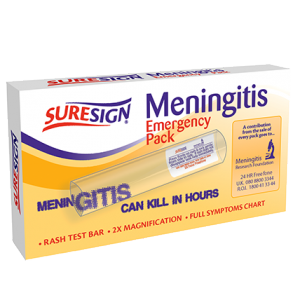Meningitis is an inflammation to the delicate membranes that normally cover the human brain and also the spinal cord. The inflammation is normally caused by an infection from bacteria or viruses. Meningitis normally strikes suddenly and is deadly. It is therefore very important to be able to discover the telltale signs of the disorder because a Meningitis early alert can save a life. In the UK, about 100,000 people get meningitis every year. However, the mortality rate is quite low.
Types Of Meningitis
As mentioned, the inflammation that is known as meningitis can be caused by bacteria and viruses.
- Viral meningitis: viral meningitis is less serious than bacterial meningitis. The source of the viral infection can be the sinuses, ears or the respiratory tract. Viruses that cause diarrhoea also lead to meningitis sometimes. People that suffer from viral meningitis have a higher chance of surviving without any kind of brain damage.
- Fungal meningitis: this is the rarest of the three types of meningitis. It normally infects people that have a weak immune system. This means that fungal meningitis is rare in healthy people.
- Bacterial meningitis: this is the most serious and deadly type of meningitis. It is so serious that if not treated, it will kill the patient in a matter of hours. It also leads to permanent brain damage, loss of hearing and damage to other parts of the body.
The Common Symptoms Of Meningitis
As mentioned, meningitis results from viruses, fungi or bacteria that affected the body in another infection. Meningitis normally affects children under the age of five and teenagers because their immune system is still vulnerable. Here are the symptoms to look out for in children over the age of two:
- A sudden high fever
- A severe headache that isn’t normal or like other types of headache. The headache may be accompanied with nausea and vomiting.
- Having a stiff neck
- Disorientation and lack of concentration
- Skin rash in the case of meningococcal meningitis
- Seizures and sensitivity to light
For newborns, it is important to note the following meningitis danger signs as soon as they occur and get medical help.
- A bulge on the baby’s fontanel
- Irritability, poor feeding and restlessness
- A high fever and constant crying
- Having a stiff body and neck.
When newborns have contracted meningitis, they are very hard to comfort and normally cry harder when you attempt to comfort them. You should seek medical attention immediately if any family member is experiencing any of the following symptoms: a severe unrelenting headache, high fever, confusion, vomiting and a stiff neck.
As mentioned, meningitis is a serious infection that kills within hours. It is therefore important to get medical attention as soon as you suspect that anyone close to you may have been infected. It is also important to note that it is a communicable disease and in case of an outbreak, isolating the sick people is one of the best ways to stop the spread. However, if you are able to get medical help early enough, meningitis is treatable.

The Suresign Meningitis Emergency Pack has been developed to improve awareness and help identify the early signs and symptoms of meningitis and septicaemia. It is now available online from Zoom Health.
Meningitis Prevention
While meningitis can be deadly if not treated quickly, there are ways to help prevent infection in the first place. Here are some tips for prevention:
- Get vaccinated. There are vaccines available to protect against the most common causes of bacterial meningitis such as meningococcus, pneumococcus, and Haemophilus influenzae type b (Hib). Make sure to follow the recommended vaccination schedule for infants and children. Adults may also need a booster shot depending on risk factors.
- Practice good hygiene. Simple hand washing, covering coughs and sneezes, and avoiding sharing drinks or utensils can help stop the spread of bacteria and viruses that cause meningitis.
- Know your risk factors. Those with compromised immune systems, living in close quarters like college dorms, or travelling to certain parts of the world are at higher risk. Take appropriate precautions.
- Seek early treatment for infections. Many times meningitis starts with an ear infection, upper respiratory infection, or other illness. Getting prompt treatment can prevent it from turning into meningitis.
- Limit exposure when there is an outbreak. Local health departments can provide guidance on any special precautions needed. Avoiding large gatherings and close contact with anyone diagnosed can help.
The Global Impact Of Meningitis
Meningitis isn’t just a local concern – it’s a global health challenge. Every year, this sneaky disease affects millions worldwide, hitting developing countries particularly hard. Picture this: in the “meningitis belt” stretching across sub-Saharan Africa, outbreaks can spiral into full-blown epidemics, overwhelming healthcare systems.
But here’s the kicker – we’re fighting back. Global initiatives are ramping up vaccination efforts, especially in high-risk areas. It’s not just about jabs, though. Education plays a crucial role too. From bustling cities to remote villages, people are learning to spot the warning signs and act fast.
The ripple effects? They’re huge. By tackling meningitis head-on, we’re not just saving lives – we’re boosting economies and strengthening communities. It’s a classic domino effect: healthier kids mean more school attendance, leading to better job prospects down the line.
So next time you hear about meningitis, remember – it’s not just a medical issue. It’s a global puzzle we’re all trying to solve, one piece at a time.
Diagnosing Meningitis
Because meningitis progresses rapidly and can be fatal, quick and accurate diagnosis is critical. Doctors will consider symptoms, medical history, and run certain tests to determine if someone has meningitis including:
- Spinal tap to collect and analyse cerebrospinal fluid from around the brain and spine looking for signs of infection.
- Blood tests to identify bacteria or viruses in the bloodstream that cause meningitis. Blood cultures can confirm bacterial meningitis.
- CT or MRI scans to look for inflammation and swelling in the brain and tissues surrounding it. Useful if cranial pressure is of concern.
- Testing and culturing any fluid from sores or rashes that develop with some forms of meningitis to identify the bacteria.
The quicker meningitis can be diagnosed, the faster appropriate antibiotic treatment can begin. Delaying can risk permanent brain damage and even death in severe cases of bacterial meningitis. Doctors will also need to pinpoint which bacteria or virus is causing illness to select suitable medications.
Treatment And Recovery
Bacterial meningitis requires immediate treatment with IV antibiotics at the hospital along with medications to bring down fever and relieve pain. Antiviral medications may be used for viral infections. Patients are monitored closely for complications like dehydration, seizures, low blood pressure, and trouble breathing.
Most people recover fully if bacterial meningitis is diagnosed and treated rapidly. However, recovery may involve:
— Hospitalisation of 1-2 weeks or longer
— Rehabilitation for neurological damage like hearing loss
— Ongoing antibiotics to prevent infection from returning
— Seeking counselling for emotional trauma
Even with successful treatment, about 10-15% of people with bacterial meningitis will die. Up to 20% have permanent disabilities like brain damage, hearing loss, loss of limbs from tissue damage, or kidney failure. Strict follow up after discharge is key to monitor and treat any lingering effects.
Viral meningitis recovery is usually complete without severe or lasting complications. Rest, fluids and over the counter pain medication is often sufficient for home treatment. The main priority is watching closely for any worsening symptoms that might indicate bacterial infection.
After meningitis, get plenty of rest and avoid contact sports or stressful activities until fully recovered. Be diligent about following up with a doctor to prevent recurrence. Report any concerning symptoms right away as secondary infections are possible. Stay hydrated, eat well, and take it easy while your body heals.
Photo “Mum and Daughter” by Anthony Cunningham for Zoom Health
Zoom Health is a leading UK supplier of Home Health Tests and Earplugs
This post was originally published in 2018 and last updated in October 2024.





